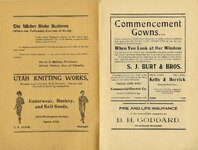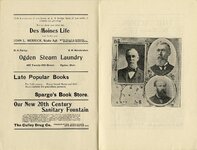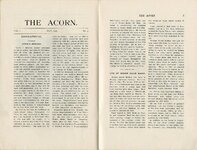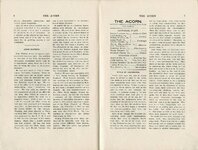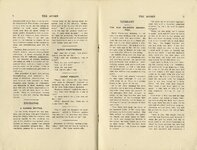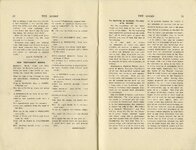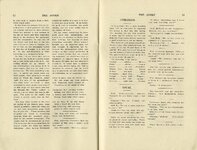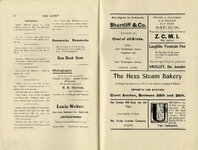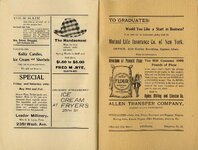| Title |
1904 The Acorn Vol. 1 No. 4 May |
| Creator |
Weber Stake Academy |
| Contributors |
Students of Weber Stake Academy |
| Description |
The Acorn is a bi-monthly literary magazine published by the students of Weber Stake Academy and Weber Academy from 1904 to 1916. |
| Subject |
Students; Forms, Literary; College students--Education; Ogden (Utah); Weber Stake Academy; Weber Normal College; Weber College; Weber State College |
| Digital Publisher |
Stewart Library, Weber State University |
| Date Original |
1904 |
| Date |
1904 |
| Date Digital |
2013 |
| Item Description |
6 x 9 in. paperback. Pages number 1-14. |
| Type |
Text |
| Conversion Specifications |
Archived TIFF images were scanned at 400 dpi with an Epson Expression 10000XL scanner. OCR done with ABBYY Reader. JPG and PDF files were created for general use. |
| Language |
eng |
| Rights |
Public Domain. Courtesy of University Archives, Stewart Library, Weber State University |
| Source |
Archives LH1.A185 |
| Format |
application/pdf |
| ARK |
ark:/87278/s67pgv3z |
| Setname |
wsu_olp |
| ID |
76681 |
| Reference URL |
https://digital.weber.edu/ark:/87278/s67pgv3z |
| Title |
007_page 12 and 13 |
| Creator |
Weber Stake Academy |
| Contributors |
Students of Weber Stake Academy |
| Description |
The Acorn is a bi-monthly literary magazine published by the students of Weber Stake Academy and Weber Academy from 1904 to 1916. |
| Subject |
Students; Forms, Literary; College students--Education; Ogden (Utah); Weber Stake Academy; Weber Normal College; Weber College; Weber State College |
| Digital Publisher |
Stewart Library, Weber State University |
| Date Original |
1904 |
| Date |
1904 |
| Date Digital |
2013 |
| Item Description |
6 x 9 in. paperback. Pages number 1-14. |
| Type |
Text |
| Conversion Specifications |
Archived TIFF images were scanned at 400 dpi with an Epson Expression 10000XL scanner. OCR done with ABBYY Reader. JPG and PDF files were created for general use. |
| Language |
eng |
| Rights |
Public Domain. Courtesy of University Archives, Stewart Library, Weber State University |
| Source |
Archives LH1.A185 |
| Format |
application/pdf |
| Setname |
wsu_olp |
| ID |
77314 |
| Reference URL |
https://digital.weber.edu/ark:/87278/s67pgv3z/77314 |


